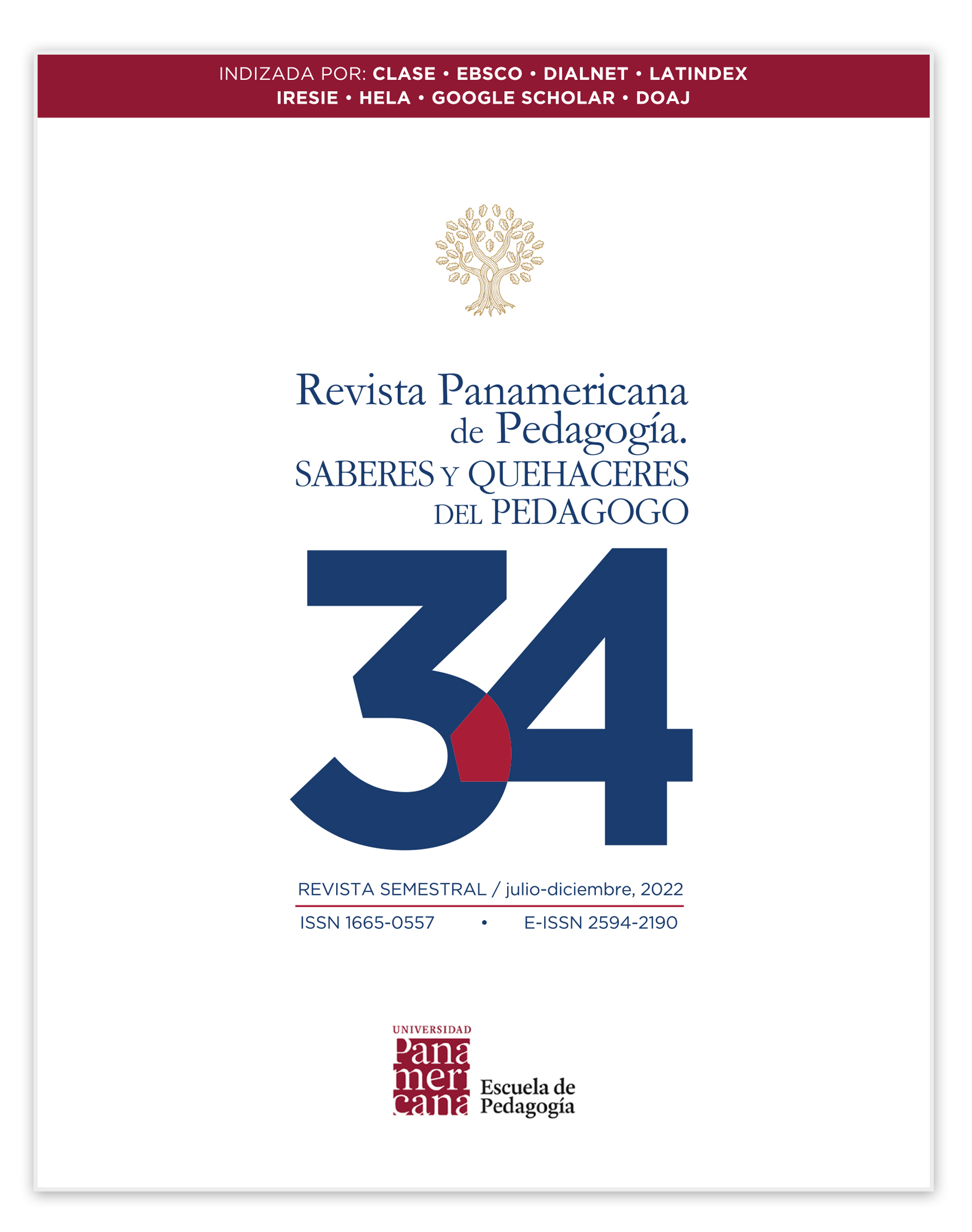Publicado 01-07-2022
Palabras clave
- representaciones implícitas,
- innovación curricular,
- docencia

Esta obra está bajo una licencia internacional Creative Commons Atribución-NoComercial-CompartirIgual 4.0.
Cómo citar
Resumen
El artículo presenta los resultados de una investigación acerca de las representaciones implícitas del profesorado de educación superior sobre la innovación curricular y su relación con el desempeño en el aula. El estudio se llevó a cabo con docentes de una licenciatura de la Universidad de Colima, en la que se implementó el modelo basado en competencias como parte de un proceso de innovación curricular. Participaron catorce docentes. La investigación se realizó bajo un enfoque cualitativo-descriptivo y se utilizó un cuestionario elaborado con base en dilemas y preguntas abiertas, como instrumento para la recogida de información. Se puede afirmar que el análisis de las representaciones implícitas de los docentes comienza en la autopercepción en torno a su desempeño; sus creencias, bagaje cultural y su contexto social, son determinantes en su concepción en relación con el aprendizaje, la enseñanza, la evaluación y la innovación. En términos generales, se identifica el compromiso con la enseñanza, el interés por los estudiantes y la contradicción entre un pensamiento lineal o progresivo y una práctica que añade herramientas didácticas que presumen de resultados metacognitivos: todo esto inmerso en un contexto de construcción y reconstrucción de la enseñanza de manera continua.
Referencias
- Ainscow, M., Booth, T., & Dyson, A. (2006). Improving Schools. Developing Inclusion. Routledge.
- Álvarez, C. (2012). La Relación Teoría-Práctica en los Procesos de Enseñanza-Aprendizaje, 30(2), 393-402. Educatio Siglo XXI.
- Behar, D. (2008). Metodología de la Investigación. http://rdigital.unicv.edu.cv/bitstream/123456789/106/3/Libro%20metodologia%20investigacion%20este.pdf
- Bellocchio, M. (2010). Educación Basada en Competencias y Constructivismo. Un Enfoque y un Modelo para la Formación Pedagógica del Siglo XXI. ANUIES.
- Boatto, Y., Vélez, G., y Bono, A. (2011). Construcción de un Cuestionario de Dilemas para Indagar las Concepciones sobre el Aprendizaje a partir de la Lectura en Ingresantes Universitarios. Summa Psicológica UST, 8(1), 13-20. https://summapsicologica.cl/index.php/summa/article/view/77/pdf
- Díaz Barriga, F., y Hernández, G. (2010). Estrategias Docentes para un Aprendizaje Significativo. Una Interpretación Constructivista. Mc Graw Hill
- Echeita, G., Parrilla, Á., y Carbonell, F. (2011). La Educación Especial a Debate. Revista RUEDES. Revista Universitaria de Educación Especial, 1(1), 35-53.
- Gómez, V., y Célis, J. (2005). Factores de Innovación Curricular y Académica. Revista Iberoamérica de Educación, 33(9), 1-13. http://rieoei.org/edu_sup31.htm
- Hernández, R., Fernández, C., y Baptista, P. (2003). Metodología de la Investigación. McGraw Hill Interamericana.
- Lagos Paredes, C., Albarrán Vergara, P., Aguilar Peña, P., y Errázuriz Cruz, M. (2016). Teorías Implícitas sobre los Procesos de Escritura: Relación de las Concepciones de Estudiantes de Pedagogía Básica con la Calidad de sus Textos. Estudios Pedagógicos, XLII(3), 7-26. https://www.redalyc.org/articulo.oa?id=173550019001
- Lugo Villaseñor, E. (2008). Reformas Educativas, su Impacto en la Innovación Curricular y la Formación Docente. ANUIES.
- Ortega y Gasset, J. (1999). Ideas y Creencias. Alianza editorial.
- Pacheco, L. (2019). Representaciones Explícitas e Implícitas sobre el Aprendizaje y la Enseñanza en una Muestra de Docentes del Departamento de Córdoba-Colombia (Tesis doctoral inédita). Universidad del Norte. https://manglar.uninorte.edu.co/bitstream/handle/10584/8801/138919.pdf?sequence=1&isAllowed=y
- Pereira, I., y Pozo, J.I. (2014). Las Concepciones Implícitas de los Profesores Universitarios sobre los Requisitos para el Aprendizaje. Revista da FAEEBA-Educação e Contemporaneidade, 23(41), 191-203. https://doi.org/10.21879/faeeba2358-0194.v23.n41.836
- Pozo, J.I. (2001). Humana Mente. El mundo, la Conciencia y la Carne. Morata.
- Pozo, J.I. (2003). Adquisición del Conocimiento. Morata.
- Pozo, J.I. (2006). La Nueva Cultura del Aprendizaje en la Sociedad del Conocimiento. En
- Pozo, J.I., Scheuer, N., Pérez, M.P., Mateos, M., Martín, E., y De la Cruz, M. (Eds.). Nuevas Formas de Pensar la Enseñanza y el Aprendizaje. Las Concepciones de Profesores y Alumnos, 29-53. Graó.
- Pozo, J.I. (2008). Aprendices y Maestros. Alianza.
- Pozo, J.I., Scheuer, N., Mateos, M., y Pérez, M.P. (2006). Las Teorías sobre el Aprendizaje y la Enseñanza. En Pozo, J.I., Scheuer, N., Pérez, M.P., Mateos, M., Martín, E., y De la Cruz, M. (Eds.). Nuevas Formas de Pensar la Enseñanza y el Aprendizaje. Las Concepciones de Profesores y Alumnos, 95-132. Graó.
- Ramos, B. (2020). Concepciones Implícitas de Innovación Curricular de Profesores de Educación Superior (Tesis doctoral inédita). Universidad Autónoma de Tlaxcala, Tlaxcala, México.
- Reber, A. (1993). Implicit Learning and Tacit Knowledge. Oxford University Press.
- Rojas, O. (2019). Rol del Maestro en los Procesos de Innovación Educativa. Revista Scientific, 4, 4-67. https://doi.org/10.29394/Scientific.issn.2542-2987.2019.4.E.3.54-67
- Wagner, W., y Flores, F. (2010). Apuntes sobre la Epistemología de las Representaciones Sociales. Educación Matemática, 22(2), 139-162. http://www.scielo.org.mx/scielo.php?script=sci_arttext&pid=S1665-58262010000200007&lng=es&tlng=es






